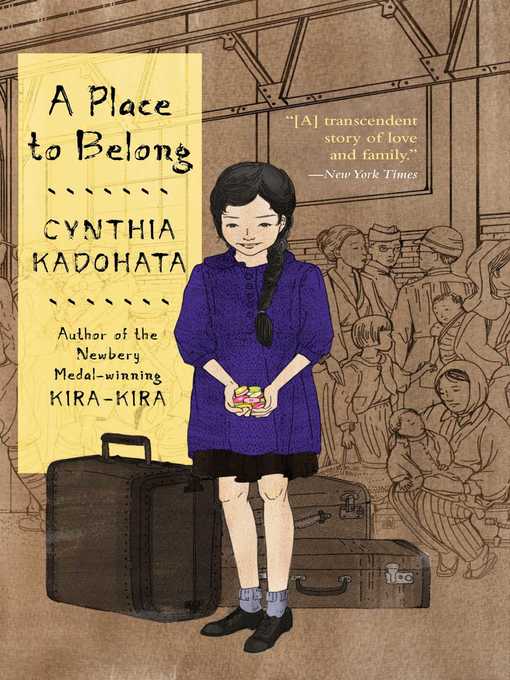
A Place to Belong
فرمت کتاب
ebook
تاریخ انتشار
2019
Lexile Score
690
Reading Level
3
ATOS
4.6
Interest Level
4-8(MG)
نویسنده
Julia Kuoشابک
9781481446662
کتاب های مرتبط
- اطلاعات
- نقد و بررسی
- دیدگاه کاربران
نقد و بررسی

Starred review from April 1, 2019
With trademark faith in her protagonist’s resilience, Kadohata (Checked) depicts an ugly chapter of history through the eyes of 12-year-old Hanako, whose parents were coerced into renouncing their American citizenship in a U.S. internment camp during WWII. After their release, they emigrate to her father’s family farm outside Hiroshima. Stepping off the train, Hanako immediately encounters bedraggled soldiers and people who barely survived the U.S. bombing, and she is embraced by her warm, good-humored grandparents. The push-pull between humanity’s best and worst and between acceptance and resistance are at the heart of this powerful and joyful work. Hanako’s philosophical awakening goes much deeper than the caught-between-cultures dilemma that the title implies. The girl forms her moral compass in an environment fraught with desperate decisions (should she give food to the bomb-scarred beggar boy or to her own little brother?), but in Kadohata’s confident hands, the drama is threaded with light, like the kintsukuroi—broken pottery mended with gold seams—that Hanako’s grandfather shows her. Kadohata’s plainspoken storytelling, in which small things, such as mochi cakes, inspire rapture, and moving halfway around the world is taken more or less in stride, will resonate with adults as well as young readers. Final art not seen by PW. Ages 10–14.

April 1, 2019
A family battered by war crosses an ocean to settle in a land still mired in suffering. Twelve-year-old Hanako, her 5-year-old brother, and her parents were interned along with over 110,000 other Japanese-Americans during World War II. Papa, who agitated for the internees' civil rights, was separated and targeted for especially harsh treatment. Having lost their restaurant and now disillusioned by America, they become expatriates, traveling to Hiroshima Prefecture to live as struggling tenant farmers with Hanako's paternal grandparents. There they confront harsh social inequities, the impact of the atomic bomb, and the privations of postwar life. Even as she is embraced with warm, unconditional love by Jiichan and Baachan, Hanako struggles to adjust. She is clearly a foreigner in the land of her forebears, an identity crisis that's exacerbated by extreme hunger, encounters with survivors of the bombing, and her loving parents' emotional stress. The third-person limited narration vividly captures Hanako's literal and figurative journeys as she faces complex moral dilemmas, deals with cultural dislocation and terrible uncertainty, and tries to lift the spirits of those around her. Superb characterization and an evocative sense of place elevate this story that is at once specific to the experiences of Japanese-American expatriates and yet echoes those of many others. Final art not seen. Full of desperate sadness and tremendous beauty. (afterword) (Historical fiction. 10-14)
COPYRIGHT(2019) Kirkus Reviews, ALL RIGHTS RESERVED.

Starred review from May 1, 2019
Gr 5 Up-World War II has ended and 12-year-old Hanako, her five-year old brother Akira, and their American-born parents have spent the past four years imprisoned in a series of internment camps. Hana's parents accept an offer from the U.S. government to renounce their American citizenship and expatriate to Japan. Their plan is to live with Hanako's father's parents, poor tenant farmers outside the city of Hiroshima. Hanako is hopeful for her family's new chance in Japan and immediately loves her Jiichan and Baachan but is faced with the realities of life in an unfamiliar, war-blighted country. Resources are scarce; as her family toils endlessly to keep food in the house, Hanako is torn between providing for her family and sharing what little she has with the people she encounters around Hiroshima. In her trademark style, Kadohata unfurls the complex web of the girl's inner thoughts in a concise yet cutting third-person narrative. Hanako attempts to discern what it means to be good and how to belong in a place where one is not truly welcome. An afterword gives further details on the history of internment and expatriate Americans in Japan. VERDICT A first purchase for collections needing complex and emotionally impactful historical fiction.-Darla Salva Cruz, Suffolk Cooperative Library System, Bellport, NY
Copyright 2019 School Library Journal, LLC Used with permission.

Starred review from May 15, 2019
Grades 4-7 *Starred Review* Hanako has experienced much in her 12 years. Her father owned a restaurant, but when the Japanese attacked Pearl Harbor, she and her family, like more than 100,000 Nikkei, were put into internment camps. That life was difficult, yet there were familiarities as well. Now, she and her parents and little brother, Akira, are on a boat to Japan to live with her grandparents on a tenant farm near Hiroshima. In a story that is both beautifully crafted yet utterly true to a child's innermost thoughts and feelings, Kadohata brings Hanako to a war-ravaged country, where being hungry is a fact of life and possibilities seem small. And yet: here there are grandparents who adore her and teach her new ways; it's a place where she learns how to balance tenderness and selfishness; and as she absorbs her new surroundings, Hanako becomes wedded to her heritage, discovering what families do, in ways big and small, to make one another safe and happy. As she has shown in her previous books, including the Newbery Medal-winning Kira-Kira (2004), Kadohata is superb at writing relationships, and here each unfolds like a flower. Mostly, the relationships here are intergenerational, but Hanako also meets a boy scarred from the Hiroshima bomb. The sting and purity of their interactions, as well as the history interwoven there and throughout the novel, make an indelible impression. Another gift from Kadohata to her readers.(Reprinted with permission of Booklist, copyright 2019, American Library Association.)

























دیدگاه کاربران